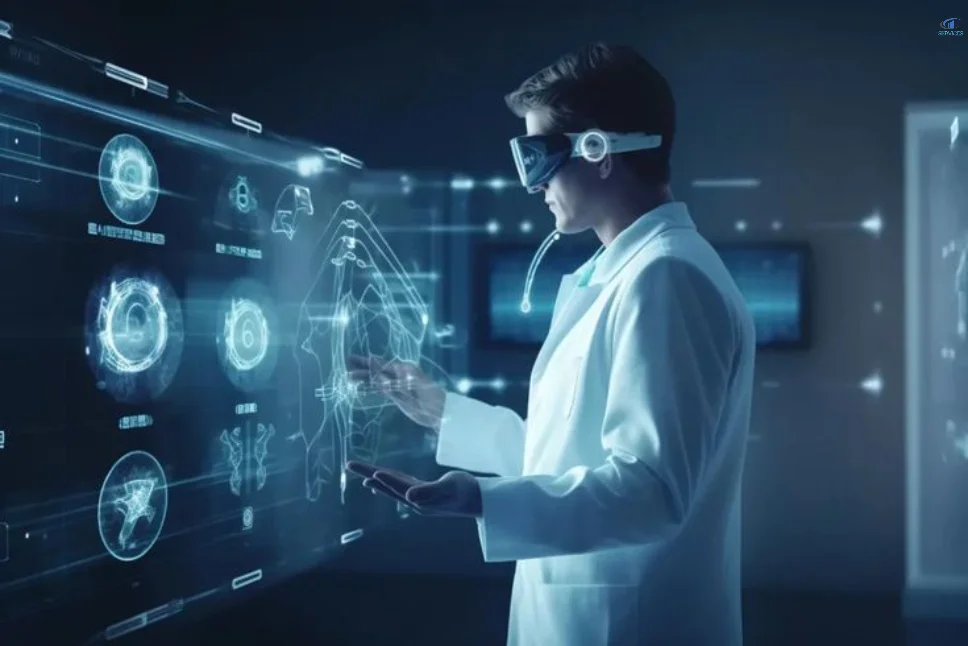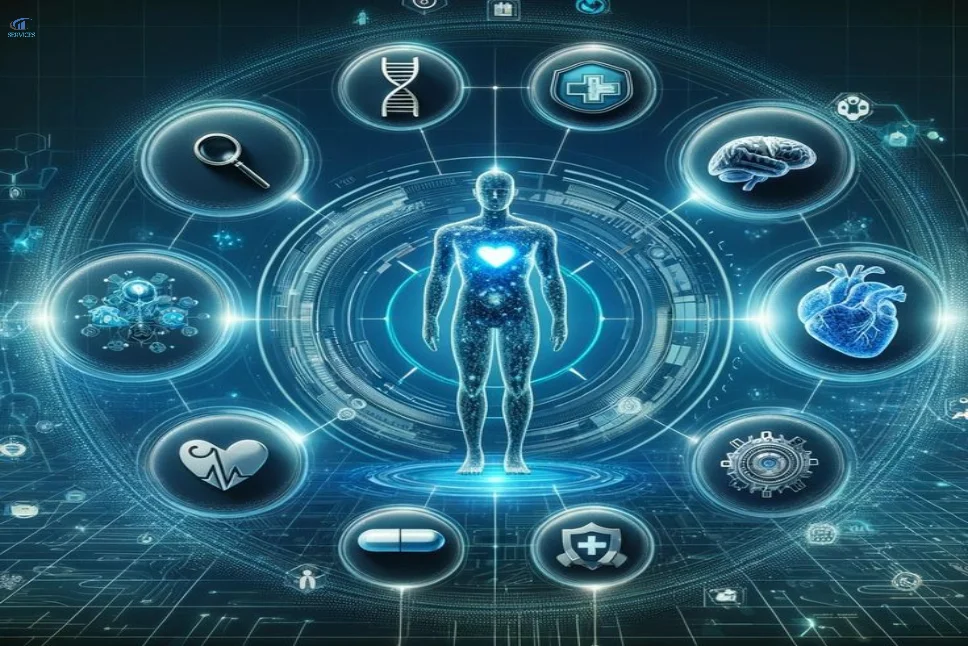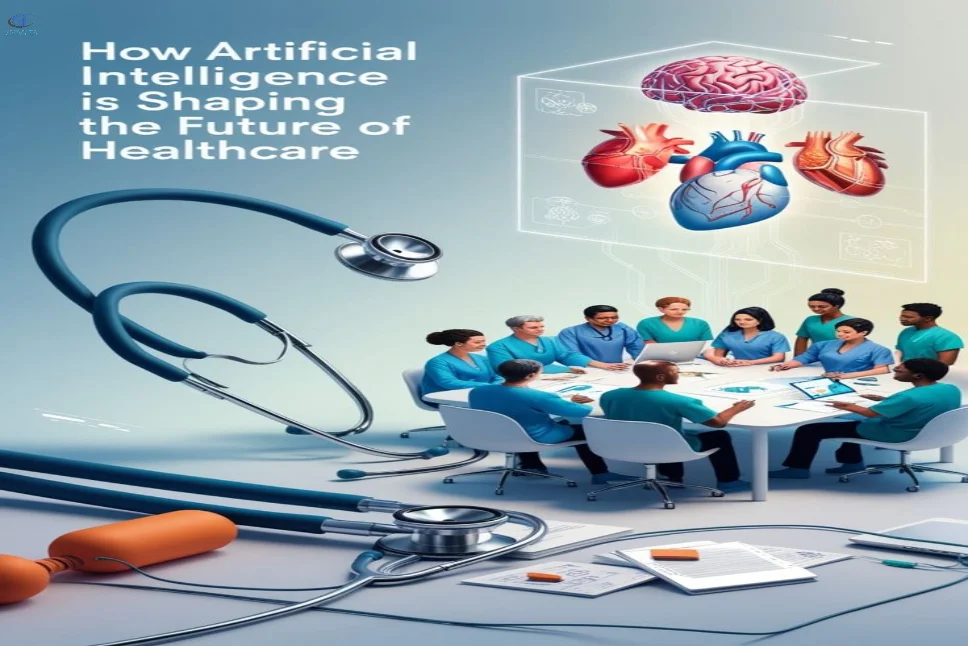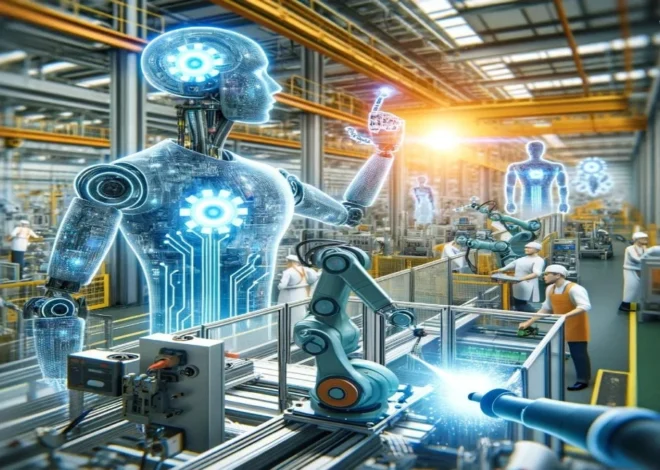
How Ai Is Transforming HealthCare
How Ai Is Transforming HealthCare: Artificial Intelligence is transforming every sector in today’s modern era, but the healthcare sector is one of the most affected and benefiting from these changes.

Let’s Talk about How Ai Is Transforming HealthCare
From patient diagnosis to personalized treatment, administrative facilities, and epidemic prevention, AI is providing a new direction to the healthcare system.
At the core, AI is reshaping the healthcare industry by streamlining operations, reducing costs, and improving diagnostic accuracy.
How is AI transforming healthcare today?
AI is revolutionizing healthcare by enabling tailored medication, accelerating treatment, and increasing diagnostic accuracy. For instance, AI systems are capable of accurately analyzing medical pictures, including CT, MRI, and X-ray scans, frequently identifying patterns that human eyes could overlook. This gives medical professionals a head start on treatment by enabling the early detection of diseases like cancer or heart issues. AI also simplifies hospital administration systems, improving the effectiveness of resource allocation, appointment scheduling, and patient record-keeping. All things considered, AI is improving patient care quality, lowering expenses, and decreasing human error.
What advantages does the application of AI in healthcare offer?
AI offers numerous benefits in healthcare, including faster, more precise diagnostics, cost reduction through streamlining operations and refining treatment plans, personalized medicine by tailoring care to patients’ unique genetic makeup, past medical conditions, and lifestyle choices, effective hospital operations management, and advancements in medical research by evaluating large datasets and forecasting outbreaks, thus enhancing public health management.
What is the main advantage of AI in healthcare?
In addition to producing insights based on data from large populations, AI can assist providers in collecting, storing, and analyzing this type of data. Medical practitioners can better manage and treat ailments by using this knowledge. AI is also beginning to be used by organizations to increase drug safety.
One of the most critical shifts is in healthcare data management, where AI organizes massive amounts of patient records, imaging, and genomic data to deliver actionable insights in real time.
How fast is AI growing in healthcare?
There should be no indications of a slowdown in the growth pace. The healthcare AI market is anticipated to grow by two-fifths (42%), and by 2025, it is anticipated to have grown by another 40%. The market is expected to increase 524% from $32.3 billion to $208.2 billion between 2024 and 2030.
Beyond administration, AI is transforming healthcare across various areas, from drug discovery and personalized medicine to predictive analytics and remote patient monitoring.
The role of artificial intelligence in health
Accurate and fast diagnosis
Artificial intelligence makes it faster and more accurate to diagnose patients’ illnesses.
- AI-based systems are successful in early diagnosis of cancer, heart diseases, and rare diseases.
- Take a closer look at X-rays, CT scans, and MRIs.
- Reduce the possibility of human errors.
Personalized Medicine
- AI analyzes each patient’s genetic makeup and medical history to recommend specific treatments.
- Treatments are more effective and less expensive.
- Patients are spared unnecessary medications and treatments.
Improvement in the health system
- Hospitals deploy AI technologies to maintain patient records.
- Managing appointments becomes easier.
- More time can be spent with patients by doctors.
Epidemic prevention
- During COVID-19, AI helped predict the spread of the virus.
- In the future, governments will be able to control diseases in a timely manner.
Benefits and concerns of artificial intelligence
Benefits
- Timely and accurate diagnosis of diseases
- Low costs and effective treatment
- Time saving in the health system
- Improvement in the quality of life of patients
Concerns
- Patient data privacy issue
- Overreliance on machines
- Lack of human empathy
What are the challenges of AI in healthcare?
Concerns about data privacy, moral conundrums, and an excessive dependence on technology are some of the difficulties facing AI in healthcare. Patient information is extremely sensitive and can result in major privacy violations if handled improperly. Furthermore, bias in data might provide unfair or inaccurate results because AI systems are only as good as the data they are trained on. Making sure that medical personnel use their skills in addition to equipment is another difficulty. Finally, not all hospitals, particularly those in underdeveloped nations, may be able to afford the substantial financial commitment and training needed to apply AI solutions.
What is one future trend of AI in healthcare?
More healthcare automation and AI will be used in 2025 and beyond to create practical, scalable, and efficient working practices. Personalized treatment plans, clinical decision support, administrative procedures, medication discovery, clinical trials, and more will all be impacted by these changes.
Together, these advancements prove that AI is not just a supportive tool but a transformative force driving the future of global healthcare.
Can AI replace medical?
AI, which was created to enhance physicians’ capacity to give treatment rather than to replace them, has revolutionized the healthcare industry. One prominent instance is in diagnostic radiography, where AI algorithms help identify diseases like breast cancer accurately, particularly in its early stages.
This change is often referred to as how AI is changing healthcare, with generative AI taking a front seat by creating clinical documentation, summarizing patient histories, and even simulating medical scenarios for training.
Can AI completely replace doctors in the future?
Because healthcare involves more than simply data and diagnosis—it also involves empathy, moral judgment, and human judgment—AI cannot fully replace doctors. AI lacks the emotional intelligence and human touch that are essential in doctor-patient relationships, even if it is very good at analyzing large datasets, identifying trends, and making predictions. Patients frequently require holistic treatment, empathy, and reassurance—qualities that can only be given by human physicians. Therefore, rather than replacing doctors, AI will help them accomplish their jobs more accurately, efficiently, and patient-centeredly in the future of healthcare.
How does AI support telemedicine?
AI is enhancing telemedicine through appointment scheduling, illness triage, and patient inquiry management. By evaluating wearable gadget data and patient symptoms, it helps physicians conduct remote consultations and guarantees correct medical advice for underprivileged areas. Language barriers are removed by AI translation systems, improving healthcare’s affordability, ease of use, and accessibility.

In Abstract
Artificial intelligence has brought a revolution in the healthcare sector. It not only enables timely diagnosis and treatment of diseases but also makes the healthcare system more efficient, organized, and patient-friendly. In the coming time, AI will play a fundamental role in further improving the world of healthcare.
A notable application is in radiology, where AI is changing healthcare for radiologists by detecting anomalies in scans faster than traditional methods, assisting in early diagnosis, and reducing workload pressure.



